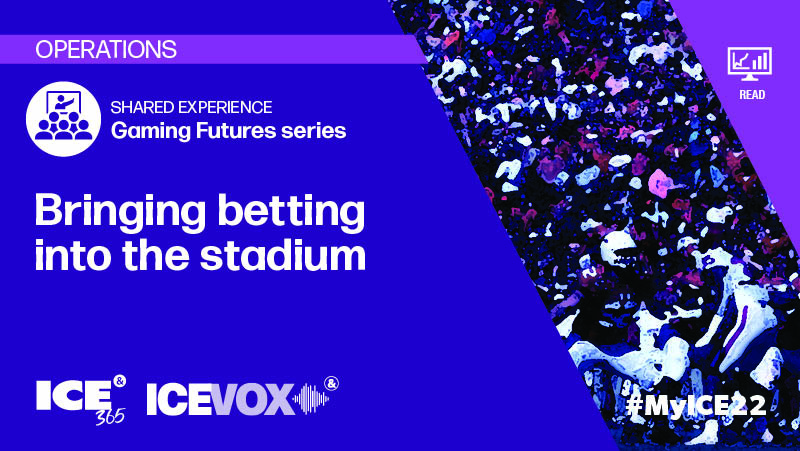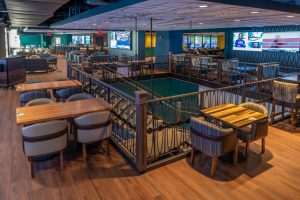Bringing betting into the stadium

The core channels for legal betting are in-person and digital. Almost any casino in a state with legal sports betting will have a physical sportsbook somewhere on the property. It’s an offering Las Vegas vacationers have known for years, and it’s finally spreading into the further legal reaches of the US.
Dive one level deeper – specifically into in-person betting – and you’ll encounter an intriguing juxtaposition. The way sports betting laws are structured, operators originally had the casino as the main outlet for a physical offering. As more states come online and look to cut sports teams into the action and to mitigate a lack of land-based tethering partners, arenas and stadiums are emerging as another key outlet.
These are different beasts. But sports organisations, sportsbook operators and major league teams are hopping on the bandwagon to make the most of the sports betting opportunity. Though there are fundamental differences between casinos and arenas, the aim is to provide entertainment to bettors.
In that respect, they are both focused on offering an engaging and exciting experience to customers, Caesars Sportsbook’s senior vice president of operations David Grolman says.
He highlights the communal atmosphere that casino sportsbooks provide, giving bettors a dedicated space to enjoy their shared fandom.

“Our sportsbooks at arenas, like our history-making Caesars Sportsbook at Capital One Arena, are venues designed for a broader customer experience,” Grolman explains. “They serve sports bettors, of course, but also attract business meetings, happy hours, watch parties and other demographics outside of the traditional sports bettor.”
While casinos are ready-made for betting, arenas are geared towards the everyday sports fan. Sportsbooks located within arenas benefit from a broader overall scope. On the other hand, arenas also have the added consideration of their local fandom.
Monumental Sports & Entertainment owns Capital One Arena, and the company partnered with Caesars to open an onsite sportsbook destination. Monumental’s reach spans multiple related industries. It owns six different sports teams, five venues in the greater DC region, and various equity investments across multiple business sectors including esports and media networks.
Capital One Arena, the biggest venue in its portfolio, has proven an excellent case study in how to succeed with an in-arena sportsbook.
Jim Van Stone, president of business operations and chief commercial officer for Monumental Sports & Entertainment, explains that the company needed a strong, knowledgeable partner to build a successful betting space at the arena.
“What we’re good at is owning and managing sports teams and running sports businesses,” Van Stone says. “We realised very quickly that we had to find a reputable operator and partner.”
Caesars ended up becoming that partner after a rigorous RFP process, and Van Stone is quick to list the myriad benefits of the relationship.
“We have a fantastic sponsorship and partnership with Caesars,” he says. “It’s about the experiential side of things. We’re equity partners with Caesars in our food and beverage business at the sportsbook, and we work with them on an events programme in terms of activating the space itself.
“We’ve got a broadcast studio where we now produce a two-hour sports betting show, which we then broadcast on our Monumental Sports Network. Our reliance on the operator is key to this mix.”
This has led to significant returns. While the property’s in-person book and mobile betting within a two-block radius is dwarfed by the reach of the DC Lottery’s Intralot-powered statewide offering, it far outstrips it in terms of handle and revenue. In the 2021 fiscal year to 30 September 2021, $144.3m was staked via the Caesars sportsbook, leaving revenue of $21.2m.
Over the same period, $42.2m was staked via the lottery’s Gambet app, generating revenue of $7.7m.
Compare and contrast
The 2021 figures suggest the claim that mobile always outstrips retail doesn’t apply in DC, but sportsbooks aren’t a one-size-fits-all business. That’s especially true for arena venues with unique spatial needs and limitations. Some similarities from the casino world do spill over into arena sportsbooks, and operators are able to take learnings from one sector and use them in the other.

From a construction standpoint, arenas present an interesting hurdle.
“Each type of space requires a unique approach,” says Caesars’ Grolman. “The infrastructure is already in place for casino-based books, whereas the build is typically created from scratch at an arena.
“When we set out to open the first retail sportsbook within a US professional sports facility […] at Capital One Arena, we set out to create something that couldn’t be templated. We really take a localised approach to the design and construction of each new project, it’s not just a copy and paste execution.”
Overall, the in-arena sportsbook experience will still boast the look and feel of a casino location, but there’s added flair when you visit a book nestled within an existing region and its fanbase.
“The experience at Capital One Arena is similar to what you’d see at a sportsbook in Las Vegas. It’s first class and state-of-the-art,” says Van Stone.
But of course, there are key differences that go a long way in defining the sportsbook experience for fans.
Van Stone continues: “The other piece that’s different about the arena is their focus on the flexibility of ingress and egress into the 20,000-seat arena. We’ve got two entry points: one on the first floor and one on the second floor. The second floor has a glass wall we can open to allow people to seamlessly go from the concourse into the sportsbook.”
As Van Stone describes it, the in-arena approach bears certain similarities to a casino sportsbook. At a Las Vegas sportsbook property, you’re usually only a few steps away from a slot machine or various other gaming options. At an arena, the sportsbook and the in-game action are separated only by a glass entryway.

That experience doesn’t end at the entrance to the sportsbook, however. “If a fan can’t go into the sportsbook they can bet seamlessly on the Caesars app inside the arena,” he says. “We utilised a lot of the concourse signage around the building to educate people on downloading the Caesars mobile app.”
For a sports fan already inclined to bet, that’s an easy in. But Grolman notes the need for a wide-reaching approach to an in-arena sportsbook. “We always want to create a destination that is attractive to a wide range of customers,” he says.
“Sports fans are the primary clientele, but creating a venue that could bring in foodies, business meetings, event planners and groups of friends or families is something we didn’t want to lose sight of. Our goal was to create a space that our sports bettors want to engage with while also creating an all-inclusive space that’s inviting for non-sports bettors. That can be the determining factor for success in these spaces.”
Along those lines, Van Stone adds that the educational aspect of in-arena sportsbooks is crucial. “When you have a new experience, the education process is so critical and important. I would say it wasn’t an insurmountable obstacle; it was just something that was going to be a major project for [Monumental] and Caesars as partners.”
The home field fan advantage
In a casino, you’ve got bettors wandering the floor at all hours of the day. In a stadium, you have tens of thousands of fans flocking to the locale for a single event. That requires a more personal touch, an understanding that the fans are there for a specific reason.
“Both the NBA and NHL, from a league standpoint, give teams on the local level some great direction and guidance,” says Van Stone.
Grolman adds the Capital One sportsbook has been designed to pay homage to its host city. This includes iconic photos and championship memories from the Washington Wizards and Capitals wrapping the interior, memorabilia, and a ‘Minitron’ – a scaled-down version of the arena’s Jumbotron.
“Beyond that, wall-to-wall TVs, LED screens with odds and trend updates as far as the eye can see, and a menu curated in partnership with a Michelin-starred chef are all strategically incorporated to make the sportsbook a destination that connects with the city.”
Sporting franchises are core facets of their home communities. Caesars and Monumental keep that ideology in mind to bring an authentic experience to fans in the Washington area. And in the case of Capital One Arena, fans have appreciated the sportsbook.
“Our upfront research told us that our fans are really supportive,” Van Stone says. “They felt so much more engaged in the team and the leagues based on having the ability to bet on their favourite teams.
“The response has been great. Looking at the crowds, the place is packed both pre-game and post-game, so I feel really good about it. The other thing I’ve been excited about watching is the building. We have over 100 dark days a year, but the building is busy on big sports days that are non-events that we have here at Capital One Arena.”
Owning all the teams and managing the venues allowed Monumental to gather feedback to the operator. This was informed by its own experience of managing the building – which hosts 230 events each year – so it knows what makes people arrive early, what engages then during an event, and what encourages them to stay after.
“For example, on a Cats or Wizards game day, we send out pre-game notes in the morning to give people a tutorial of what to expect when they arrive at the venue, highlighting some of the great food experiences that could be available, showcasing the sportsbook, and more. We integrate a lot of different content opportunities.”
On the horizon
Caesars, naturally, continues to launch its sportsbook in new markets and expand its online betting footprint as legislation allows.
Monumental Sports & Entertainment, meanwhile, is looking ahead at new opportunities to engage fans.
“I will say the one thing that is critical for us as an organisation is the customer experience and customer service,” says Van Stone. “We’re focused on investing a lot into the customer journey, making sure they have a fantastic time at our events and properties.”
“We’ve been lucky,” he concludes. “We’ve been one of the busiest buildings in the country. I think making sure those guests have a great experience is going to be our biggest ongoing priority.”
